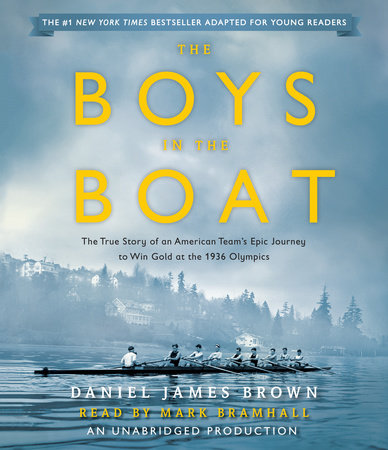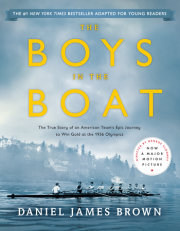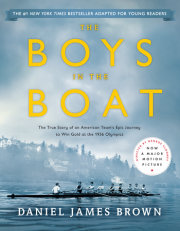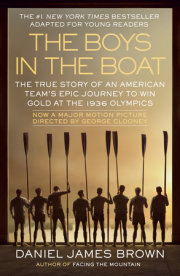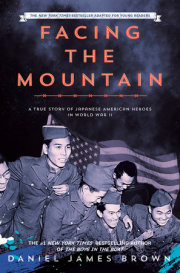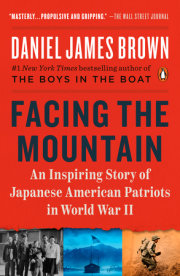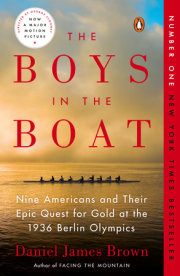Ever since The Boys in the Boat was first published, I have been traveling around the country talking to people about the story. When I first started, I quickly noticed that most of the people in my audiences were quite old. Some of them, in fact, were old enough to remember the events at the heart of the story, even though those events took place almost eighty years ago.
But lately something interesting has begun to happen. More and more young people have begun to show up at my book talks. Often these younger people join with the older people, coming up to the front of the room to have their books signed. Frequently they pause at the signing table just to tell me how much they enjoyed the story and what it means to them personally. It sometimes seems strange to me to have a ninety-year-old grandma and a twelve-year-old student standing next to each other in front of me at the signing table. But listening to what both groups of readers have to say about the story, I have begun to understand. Some things are timeless.
At first glance, this may seem to be a story about a time and place that is very different from the time and place you live in. After all, the young men at the center of this story dressed very differently than you and your friends do. They talked differently. They drove cars that look now as if they belong in museums. They sang songs that sound corny to our modern ears. They thought a radio was a marvel of modern technology. They lived through world events that now seem almost like ancient history.
But here’s the thing. The boys in the boat were just that: boys. The problems they wrestled with were the same that you and your friends likely wrestle with today: family problems, making the team, succeeding at school, fitting in with other kids, learning whom you can and can’t trust, finding a way to make some money, figuring out how you feel about the opposite sex, deciding who and what you want to be a few years down the road. Under the surface, they really weren’t all that different.
None of that, though, is really what the young people who come up to me at book events want to talk about. What they recognize in the story—and what they want to share with me—is the sheer excitement of being young, having a goal, striving to accomplish that goal, and making it happen, just as the boys in the boat did. Sometimes they talk about their volleyball team winning the regionals. Sometimes they talk about making first violin in the school orchestra. Sometimes they talk about wanting to be the first in their family to go to college. Sometimes they talk about falling short of their goal but being inspired by the book to try again.
It is easy for those of us who are older and count ourselves wise to forget that it is the young who most often move the world forward. It is the young who have the boundless energy, passion, optimism, courage, and idealism to try to do what we elders might say is impossible. That’s what the boys in the boat attempted to do in this story. That’s why, eighty years later at my book-signing table, old men and women come to me with tears in their eyes, proudly remembering when they were young and full of fire. And it’s why standing right next to them are young men and women with beaming faces, bearing tales of their own brave attempts at the near impossible.
So as you read this book, I hope you will keep in mind that at its heart this is a story about growing up, about wrestling with hope and doubt, about dreaming big, about going for the gold. In that sense, it’s really a story about you.
Dawn row on Lake Washington.
This book is a true story. It was born on a cold, drizzly, late spring day, several years ago, when I climbed over a split-rail cedar fence and made my way to the modest house where Joe Rantz lay dying.
Joe was my neighbor Judy’s father, and she had asked me to come down and meet him. I knew only two things about him when I knocked on her door that day. I knew that in his midseventies he had single-handedly hauled a number of cedar logs down a mountain, cut and split them by hand, then built the nearly half-mile-long pasture fence I had just climbed over. And I knew that he had been one of nine young men from the state of Washington who shocked both the sports world and Adolf Hitler by winning a gold medal in rowing at the 1936 Olympics.
When Judy opened the door and ushered me into her cozy living room, Joe was stretched out in a recliner with his feet up, all six foot three of him. He had a thin white beard, and his eyes were puffy. An oxygen tank stood nearby. Rain flecked a window that looked out into the wet woods. A fire was popping and hissing in the woodstove. Jazz tunes from the 1930s and 1940s were playing quietly on the stereo.
Judy introduced me, and Joe offered me an extraordinarily long, thin hand. We talked for a while. Joe’s voice was thin and reedy, not much more than a whisper. When the conversation began to turn to his own life, I leaned closer and took out my notepad. I was surprised at first, then astonished, at what this man had endured and overcome in his life. But it wasn’t until he began to talk about his rowing career that he started, from time to time, to cry. He talked about learning the art of rowing, about the sleek and delicate wooden boats known as “shells,” about tactics and techniques. He told stories about long, cold hours on the water under steel-gray skies, about smashing victories, and about marching under Adolf Hitler’s eyes into the Olympic Stadium in Berlin. But it was when he tried to talk about “the boat” that the tears really welled up in his bright eyes.
At first I didn’t know what he meant by “the boat.” I thought he meant the Husky Clipper, the racing shell in which he had rowed his way to glory. Then I thought he meant his crewmates. Eventually I realized that “the boat” was something more than just the shell or its crew. To Joe, it was something bigger than that, something mysterious and almost beyond definition. It was a shared experience, a golden moment long ago, when he had been part of something much larger than himself. Joe was crying partly for the loss of that moment, but much more for the sheer beauty of it.
A Washington crew working out, circa 1929.
As I was preparing to leave that afternoon, Judy removed Joe’s gold medal from the glass case against the wall and handed it to me. The medal had vanished once, years before. The family had searched high and low, then given it up for lost before they finally found it, buried in some insulating material in the attic. A squirrel had apparently taken a liking to the glimmer of the gold and hidden the medal away in its nest. As Judy was telling me this, it occurred to me that Joe’s story, like the medal, had been squirreled away out of sight for too long.
I shook Joe’s hand and told him I would like to come back and talk to him some more. I said that I’d like to write a book about his rowing days. Joe grasped my hand again and said he’d like that, but then his voice broke once more. “But not just about me,” he whispered. “It has to be about the boat.”
The Washington shell house, 1930s.
1
On a sunny October afternoon in 1933, two young men, taller than most, hurried across the University of Washington’s campus. The school was perched on a bluff overlooking the still waters of Seattle’s Lake Washington. A gray, overcast morning had given way to a radiant day, and students were lounging on the grass in front of the massive new stone library, eating, chatting, and studying. But the two boys, both freshmen in their first weeks of college, did not stop. They were on a mission.
One of them, six-foot-three Roger Morris, had a loose, gangly build, dark hair, and heavy black eyebrows. The other, Joe Rantz, was a pencil tip shorter, but more solidly built, with broad shoulders, powerful legs, and a strong jaw. He wore his blond hair in a crew cut and watched the scene through gray eyes verging into blue.
The boys, who had recently met in engineering class, rounded the library and descended a long grassy slope. They crossed Montlake Boulevard, dodging a steady stream of black automobiles. After a few more turns they followed a dirt road running through open woods and into a marshy area at the edge of Lake Washington. As they walked they began to overtake other boys headed in the same direction.
Finally they came to a point of land jutting out into the water. An odd-looking building stood there, an old airplane hangar covered with weather-beaten shingles and inset with enormous windows. The sides slanted up toward the roof. At the front, a wide wooden ramp stretched from enormous sliding doors to a long floating dock. Lake Washington spread out to the east. The canal known as the Cut stretched to the west, connecting to Portage Bay and the calm waters of Lake Union.
A crowd of young men, 175 in all, milled about nervously. They were mostly tall and lean, like Joe and Roger, though a dozen or so were noticeably short and slight. And they all shared the same goal. They wanted to make the University of Washington’s freshman rowing team.
A handful of current team members, older boys wearing white jerseys emblazoned with large purple Ws, stood with their arms crossed, eyeing the newcomers, sizing them up. Joe and Roger stepped inside the building. Along each wall of the cavernous room, the long, sleek racing shells were stacked four high on wooden racks. With their polished wooden hulls turned upward, they gleamed in white shafts of light that fell from the windows overhead. Faded but still colorful banners from rival colleges hung from the rafters. Dozens of spruce oars, each ten to twelve feet long and tipped with a white blade, stood on end in the corners of the room. The air was dry and still. It smelled sweetly of varnish and freshly sawn cedar. The sound of someone working with a wood rasp came from the back, up in a loft.
Joe and Roger signed in, then returned to the bright light outside and sat on a bench, waiting for instructions. Joe glanced at Roger, who seemed relaxed and confident.
“Aren’t you nervous?” Joe whispered.
Roger glanced back at him. “I’m panicked. I just look like this to demoralize the competition.” Joe smiled briefly, too close to panic himself to hold the smile long.
For Joe, more than anyone else there, something important hung in the balance that day, and it was more than a spot on the crew. He already felt as if he didn’t fit in with most of the other students on campus. Most of the young men around him were city boys dressed neatly in freshly pressed woolen slacks and expensive cardigan sweaters. Their fathers were doctors and lawyers. They were mostly unbothered by the problems plaguing so much of the country that fall.
America was in the fourth year of the Great Depression. Ten million people had no job and no prospect of finding one. No one knew when the hard times might end. As many as two million people were homeless. In downtown Seattle that morning, hungry men stood in long lines waiting for soup kitchens to open. Others prepared to spend the day trying to sell apples and oranges for a few pennies apiece. Down by the waterfront, in a crowded shantytown called Hooverville, mothers huddled over campfires and children awoke in damp cardboard boxes that served as their beds.
Seattle’s Hooverville.
Joe himself had been on his own for years, with no one at home to support him. Every day he wore the same old wrinkled hand-me-down sweater and the same dusty old shoes. He had worked for a year after high school to save up enough money to pay for his first year of college. Yet his savings were probably not going to last. If he ran out of money, there was a good chance he’d have to drop out of school, head back to his small, bleak hometown, and look forward to a life of odd jobs, foraging in the woods for food, and living alone in a cold, half-finished house. A spot on the freshman crew could prevent that. Each rower was guaranteed a part-time job on campus. That job might just bring in enough money to get Joe through four years of school. Then he could earn an engineering degree and find a good job. If all went well, he could marry his high school sweetheart, a bright, pretty girl named Joyce who stood by him no matter what.
But making the team was not going to be easy. Within a few short weeks, only a handful of the 174 boys gathered around him would still be contenders for seats in the first freshman boat. That was the one Joe felt he needed to be in to guarantee his place on the team. In the end, there were only nine seats in the boat.
Harry, Fred, Nellie, and Joe Rantz, circa 1917.
2
The path Joe followed down to the shell house that afternoon was only the last few hundred yards of a much longer, harder, and at times darker journey.
Joe was the second son of Harry Rantz and Nellie Maxwell. Harry was a big man, well over six feet tall, large in the hands and feet. He was a tinkerer and inventor, a dreamer of big dreams. In his spare time he loved to work with his hands and build contraptions of all kinds. He fiddled with machines, took apart mechanical devices in order to understand them. He even designed and built his own version of an automobile from scratch. Nellie Maxwell was a piano teacher and the daughter of a preacher. They had their first child, Fred, in 1899. Seven years later, looking for a place where Harry could make his mark on the world, they headed west from Pennsylvania, crossed the country, and settled down in Spokane, Washington.
The town was surrounded by ponderosa pine forest and open range country. The summers were crackling hot, the air dry and perfumed with the vanilla scent of ponderosa bark. In the autumn, towering dust storms would blow in from the wheat country to the west. The winters were bitter cold, the springs stingy and slow in coming. The Rantz family moved into a small frame house on the north side of the cold, clear Spokane River, and Joe was born there in March of 1914.
Harry set up an automobile shop. Each morning he rose at four thirty to go to work, and often he didn’t return home until well after seven in the evening. It was hard work, but his business did well and he was able to buy his family nice things. Nellie taught piano to neighborhood children and doted on her sons, lavishing love on them and watching over them carefully.
On Sunday mornings the family attended church together, then spent the day relaxing. Sometimes they just walked into town to buy freshly made peach or strawberry ice cream. Sometimes they drove out to a nearby lake, where they could rent boats and explore the shoreline or spend a hot afternoon swimming or sitting on the grassy banks enjoying a picnic. But the best part for Joe was when they went to Natatorium Park in the cool shade of the cottonwood trees down by the river. Something interesting and fun was always going on there. They could watch a baseball game or listen to a John Philip Sousa band concert. What Joe particularly loved was when his parents would put him on the park’s spectacular new carousel and he could ride, whirling around and around on the back of a carved tiger or elegant horse under the carousel’s dazzling lights.
Young Joe.
But when Joe was just about to turn four, this dream life shattered. His memories of what happened next were a kaleidoscope of broken images. He remembered his mother standing by his side in an overgrown field, coughing violently into a handkerchief, and the handkerchief turning bright red with blood. He remembered a doctor with a black leather bag. He remembered sitting on a hard church pew swinging his legs while his mother lay in a box at the front of the church and would not get up. He remembered lying on a bed with his big brother, Fred, perched on the edge. He remembered Fred talking softly about dying and about angels and about needing to go to college and about how Joe would have to go east to stay with relatives in Pennsylvania. He remembered sitting quietly alone on a train for long days and nights, with blue mountains and green muddy fields and rusty rail yards and dark cities full of smokestacks all flashing past the window by his seat. He remembered meeting a woman who said she was his aunt Alma and then, almost immediately, becoming terribly sick. He remembered lying for weeks in a bed in an unfamiliar attic room with the shades always pulled. No Ma, no Pa, no Fred. Only the lonely sound of a train now and then, and a strange room spinning around him. Plus the beginnings of a new heaviness, a feeling of doubt and fear pressing down on his small shoulders and congested chest.
As he lay ill with scarlet fever in the attic of a woman he did not really know, the world he had known back in Spokane dissolved. His brother had gone off to finish college. His mother was dead of cancer. His father had fled to Canada, unable to cope with his wife’s terrible death.
Joe's mother, Nellie.
A little more than a year later, in the summer of 1919, his brother called for him, and five-year-old Joe rode the train back across the country again all by himself. Although he was only twenty, Fred had married and found a good job, and he took care of his little brother for the next two years. By that point, their father, Harry, had returned from Canada, married a young woman named Thula LaFollette, and built a new house in Spokane.
Harry in a car he built.
For Joe, that meant still more change. Soon he was moving to another new home, living with a father he hardly remembered and a stepmother he did not know at all. But at least it was a real home, and in time this new life began to feel normal. The house was spacious and well lit. Out back there was a swing with a wide seat big enough for him and his father and Thula to ride three at a time on warm summer nights. He could walk to school, cutting through a field where he would sometimes snatch a sweet ripe melon for an after-school snack. He dug long, elaborate underground tunnels in the vacant lots nearby, and spent long, cool afternoons in them escaping Spokane’s searing, dry summer heat. And the new house was always filled with music. Harry had kept Nellie’s most precious possession, her piano, and he delighted in sitting at the keys with Joe. Harry pounded out popular tunes as his son, perched on the bench next to him, gleefully sang along. Although she was an accomplished violinist, Thula did not join in. She didn’t like the often corny music Harry and Joe chose, and she was not particularly happy to have Nellie’s piano in her house.
In January 1922, Harry and Thula had a boy named Harry Junior, and the following year they had another son, Mike. With his family growing and more mouths to feed, Harry had to take a job at a gold mine in Idaho some 140 miles away. He’d work there during the week, then make the long drive home on the weekends.
During one of these weekend visits, in the middle of a dark, moonless night, nine-year-old Joe suddenly awoke to the smell of smoke. He heard flames crackling somewhere in the house. He snatched up baby Mike, grabbed Harry Junior, and stumbled out of the house with his little half brothers. His father and Thula burst out of the house in singed nightclothes a few moments later. Once he saw that his boys were safe, Harry dashed back into the smoke and flames. Several minutes passed before he reappeared. With the fire raging behind him, he was pushing Nellie’s piano inch by inch out through a garage door. He had risked his life to save the last thing he had left from his first marriage. Now, as Joe stood and watched their home burn to the ground, he had that same feeling he’d experienced in his aunt’s dark attic years before. The same coldness, fear, and insecurity. Home, it was beginning to seem to him, was something you couldn’t necessarily count on.
George Pocock, Rusty Callow (Washington coach before Ulbrickson), Ky Ebright, and Al Ulbrickson.
3
The Washington shell house would eventually become a kind of home to Joe Rantz, but on the first day of practice he and the other freshmen did not even row. The afternoon was largely consumed by the collection of facts and figures. Joe and Roger and all the other hopefuls were told to step onto scales, to stand next to measuring sticks, to fill out forms detailing their medical backgrounds. Assistant coaches and older students carrying clipboards stood by, eyeing them and recording the information.
Few of the young men assembled outside the shell house that afternoon had ever rowed a stroke in their lives. Most of the freshmen were city boys, but a few, like Joe, were farm boys or lumberjacks or fishermen. They came from foggy coastal villages, damp dairy farms, and smoky lumber towns all over Washington state. Growing up, they had wielded axes and fishing gaffs and pitchforks, building up powerful arms and broad shoulders. They were strong, and the coaches knew their strength would help those boys, but they also knew rowing was at least as much art as brawn. There were a thousand and one small things that had to be learned and performed in precisely the right way to propel one of those narrow shells through the water with speed and grace. Over the next few months, the few boys who made the team would need to master every last one of those thousand and one small things. And in those few months some essential questions would be answered. Would the farm boys be able to keep up with the intellectual side of the sport? Would the city boys have the toughness to survive?
Tom Bolles.
Al Ulbrickson.
The freshman coach, Tom Bolles, was in charge that day. He would be the one to decide which nine boys would make the first freshman boat. But another man stood quietly in the broad doorway of the shell house. He was tall, with cold slate-gray eyes, and he was dressed impeccably in a dark three-piece business suit, a crisp white shirt, and a tie. His name was Al Ulbrickson, and he was the head coach of the rowing program. Ulbrickson was known as the least talkative man on campus. Some of the local sports reporters called him the “Man with the Stone Face.” He did not like to show his emotions, but he knew the sport of rowing well. He had been the lead rower, or stroke oar, of a Washington crew that had won national championships in 1924 and 1926. The college had quickly hired him as a coach after graduation. Now rowing was the center of his life and almost a religion to him.
The new boys sauntered along the dock, getting a feel for the long, yellow-spruce oars. Many of the freshmen, Ulbrickson noted, looked fit. As a group, they were tall and moved gracefully. Ulbrickson was pleased by what he saw. When Bolles and his assistant coaches released the boys for the day, Joe Rantz and all the rest straggled up the hill toward the campus. They moved in small groups, shaking their heads, talking softly among themselves about their chances of making the team. Ulbrickson stood on the floating dock, listening to the lake water lap at the shore, watching the boys leave.
He was studying them closely because he was thinking well beyond the upcoming season. The previous year had been a strong one for the Washington team. They defeated their archrivals from the University of California, then beat out the best crews the East had to offer, including Yale, Cornell, and Harvard. But Ulbrickson was not satisfied. In 1932, a crew from California had won Olympic gold. No Washington coach had ever even come close to taking a team to the Olympics. The next games were set to take place in Berlin, Germany, in 1936, and Al Ulbrickson didn’t just want to get a crew there. He wanted to bring gold home to Seattle.
To pull it off, the coach knew, he was going to have to clear a series of imposing hurdles. He’d have to outsmart Cal coach Ky Ebright, who was widely regarded as the intellectual master of the sport. Ebright had an uncanny knack for winning the big races, the ones that really counted. Ulbrickson needed to find a crew that could beat Ebright’s best when it mattered most. Then that crew would have to outrace the top boats from the East at the Olympic trials. Finally, if they did earn the right to represent the United States, they’d face the best oarsmen in the world. They would have to beat the British, who had practically invented the sport; the Italians, who had nearly won in 1932; and the Germans, who, under the new Nazi system, were said to be building extraordinarily powerful and disciplined crews.
Before he could get to Germany, though, Ulbrickson had to find the nine young men who would make up his crew. He wondered if any of those green and untested boys he had just watched on the dock might meet his strict qualifications. They’d need raw power, superhuman stamina, and solid intelligence to master the details of rowing technique. But they would need something else as well. Something even more important. To be part of that kind of crew—a gold medal crew—each young man would also have to be able to put aside his own personal ambitions. He’d have to throw his ego over the side of the boat, to leave it swirling in the wake of his shell. He’d need to pull, not just for himself, not just for glory, but for the other boys in the boat.
4
. All rights reserved. No part of this excerpt may be reproduced or reprinted without permission in writing from the publisher.

